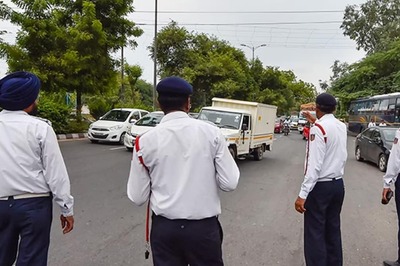Opinion | Why It’s Reprehensible to Compare Israel’s Retaliatory War with Hamas’ Nihilistic Violence

views
The propensity of Hamas to indulge in terrorism is no surprise. An outfit pursuing the worst of Islamist ideology will resort to violence at the time and place of its choosing. What’s surprising is the level of Israeli unpreparedness when Hamas unleashed its terror via land, air and sea. Israel, it seems, not just believed in its own invincibility but also, sadly, managed to convince itself about deterring Hamas from resorting to violent acts.
Israel, in that way, is the latest victim of the wokeness sweeping across the world. A phenomenon that makes one look for the ‘root cause’ of any and every incident taking place on the earth. Unfortunately, that search for the elusive root cause never goes beyond economic reasons. So, Israel was made to believe — maybe out of its war fatigue, or perhaps the top leadership genuinely felt Hamas’s terror DNA could be changed by putting in place ‘progressive’ policies on the ground — that once the living standard of people in Gaza was improved, once they were ‘mainstreamed’, once the poor Palestinians were allowed equal, non-partisan access to Israeli resources, the country’s jihadi problem would largely be resolved.
This was a pipedream, as the Saturday attack on Israel reveals: Hamas remains a fanatical Islamist outfit not averse to resorting to the worst form of terrorism that may give ISIS and Al Qaeda a run for their money.
It was Israel’s mistake of convincing itself of being in control of the Hamas narrative that divorced it from the ground reality. Given the scale of violence, Hamas must have prepared for a long time for the Saturday assault. The fact that a deeper Iranian involvement is suspected makes the Israeli intelligence failure even bigger and graver. Israel was lulled into a false sense of security.
The enemies of Israel, Hamas included, would not have got a more opportune time to target the country. Israel has been rocked by unprecedented protests against the judicial reforms initiated by the Benjamin Netanyahu government, and the US-led West’s attention is currently diverted towards the Ukraine war.
What further provoked Hamas and their hidden masters to resort to violence was the shifting geopolitical scenario in the region. Had one examined the details of the Abraham Accords, which under the aegis of the United States endeavoured to bring Israel and the Saudi-led Arab world closer to each other, it wouldn’t have been so difficult to foresee such an attack on Israel. The attack hurts Israel as much as it corners the US and Saudi Arabia in the region. As things stand today, Iran and China are expected to gain the most out of it.
If wokeness has stopped Israel from anticipating an attack from Hamas, a phenomenon that afflicts most democratic nations across the world, there’s another aspect that makes an outright victory over terrorism, especially of the Islamist variety, an almost impossible proposition. It’s the phenomenon of “neo war” — as Italian writer Umberto Eco calls the modern-day warfare in Turning Back the Clock, a book on wars and media populism — which doesn’t have a front and which never reaches its logical end.
In today’s world, the enemy is as much outside the gate as he is inside. The presence of the “barbarians” inside the country’s boundaries makes the war difficult to fight. For, unlike in the past, when the assault was a frontal one with set territories involved, and the enemies found themselves in two separate boxes, the ongoing war is a fluid one. The identity of the enemy, which was more or less certain in the past, is far more convoluted today.
To add to it is the fact that the very nature of warfare has changed, especially since the 1991 Gulf War. Writes Eco in Turning Back the Clock, “The Gulf War established two principles: One, none of our men should die. And two, as few enemies as possible should be killed.” This shift in the nature of warfare, along with the complexities introduced by the advanced stage of globalisation, has ensured that most of the military campaigns are inconclusive today. For, how can one fight decisively against an enemy who is hidden, and against whom the response would at best be restrained, short-termed and apologetic.
Just imagine the nature of the Israel-Hamas warfare in the coming days: As of today, the world largely stands with Israel. But already the players of neo-war are in place: The media has reached the war zone. While there are no direct, running footages of Hamas atrocities, except a few isolated ones such as the heartbreaking video of a tattoo artist joyfully dancing at an Israeli music festival before being stripped naked and paraded by Islamist terrorists, the acts of Israeli retaliation are duly recorded and displayed on a daily basis: The photos of charred bodies being pulled out of bombed buildings; the close-up images of wailing mothers; the tears flowing through the eyes and cheeks of young kids; and stunned Palestinian men looking at the debris where once stood their houses.
Not before long, one after another, the source of sympathy would start drying up for Israel. There would be a call for a truce. Israel would continue to defy world opinion for a while. A few Hamas leaders would be killed. A fresh sanction would be imposed on Iran. China won’t even face that, except for occasional blow hot, blow cold reactions from the West. But sooner than later, wokeism would make a comeback, asking the Israeli government to look for the “root cause” of terrorism. And Israel — and the world — would be back to square one.
A dispassionate look at history often puts things in perspective. Why did Germany, for instance, react in a diametrically opposite manner after the two World Wars — the first war saw the rise of the Nazis, while the second led to the emergence of a flourishing democracy? Maybe because in the first case Berlin was let off the hook too easily, with no collateral damage suffered by the erring Germans, while in the second instance, the retribution was overwhelming enough to utterly shock the entire system. Japan, its ally in World War II, too took the same disastrous path of self-rectification.
It’s no one’s contention that human rights should be ignored, or that civilians should be targeted. War, as such, isn’t desirable. It should not be resorted to, until all options are exhausted. But when it became imminent, there should be no second thoughts about waging it. The war against terrorism, Hamas in this particular case, requires a similar single-point attention. Unfortunately, in the age of neo-war, this doesn’t seem to be the case. We are already seeing a comparison being made of Hamas’ terror act with Israel’s retaliatory action. It is reprehensible.
But then this is why neo-wars are mostly a never-ending affair. The era of stalemates is here. And it is here to stay.
Views expressed in the above piece are personal and solely that of the author. They do not necessarily reflect News18’s views.




















Comments
0 comment